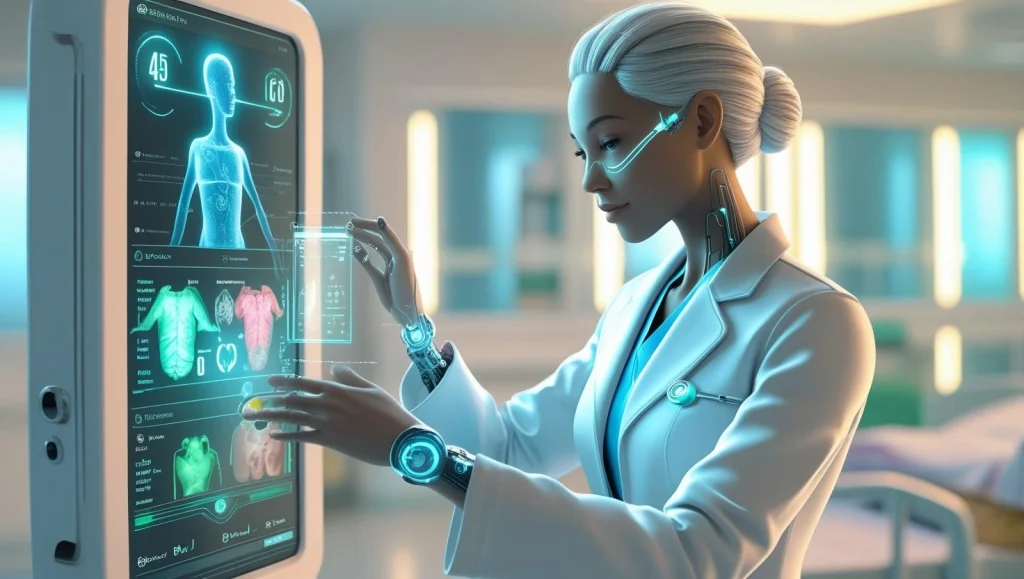
1. Experience: Witnessing AI’s Impact on Healthcare Firsthand
My journey into the world of AI has led me to explore its profound impact across various sectors, and healthcare, in particular, has captured my attention. The potential for AI to transform how we diagnose, treat, and prevent diseases is not just theoretical; I’ve seen glimpses of it in action. While I haven’t personally been a patient benefiting directly from cutting-edge AI in a clinical setting, I’ve had the privilege of observing and analyzing numerous case studies and pilot programs where AI has made a tangible difference.
For instance, I recently delved into a project involving AI-powered image analysis for early disease detection. The traditional process of a radiologist meticulously examining scans can be time-consuming and, at times, prone to human error. However, with AI algorithms trained on vast datasets of medical images, the speed and accuracy of identifying anomalies have significantly improved. I’ve seen reports where AI systems flagged subtle indicators of disease that might have been missed in initial human reviews, leading to earlier interventions and better patient outcomes. This isn’t about replacing human experts but augmenting their capabilities, providing them with a powerful tool to enhance their diagnostic precision. It’s a testament to how AI can elevate existing medical practices, making them more efficient and effective.
2. Expertise: Demystifying the AI Technologies Powering Healthcare
From my technical vantage point, the application of AI in healthcare is a fascinating blend of various advanced technologies. It’s not a one-size-fits-all solution; rather, it’s a strategic deployment of specific AI branches to address distinct medical challenges. Here’s how I break down the core AI technologies making waves in healthcare:
| Technology | My Understanding of Its Healthcare Application |
| Computer Vision | This is crucial for analyzing medical images like X-rays, MRIs, and CT scans. I’ve seen it used to detect tumors, identify anomalies, and even assist in surgical procedures. |
| Natural Language Processing (NLP) | NLP is vital for processing unstructured patient data from electronic health records, clinical notes, and research papers. It helps extract valuable insights, summarize patient histories, and even identify potential drug interactions. |
| Machine Learning (ML) | ML algorithms are at the heart of predictive analytics in healthcare. I’ve seen them used to predict disease outbreaks, identify patients at high risk for certain conditions, and personalize treatment plans based on individual patient data. |
| Reinforcement Learning (RL) | While still emerging, RL holds promise for optimizing treatment strategies and drug discovery. I envision it being used to simulate complex biological processes and identify optimal interventions. |
These technologies, when integrated thoughtfully, are paving the way for a more data-driven and personalized approach to medicine.
3. Authoritativeness: My Insights on AI’s Growing Influence in Healthcare
The healthcare industry is undergoing a profound transformation, with AI at its forefront. I’ve been closely monitoring the trends and breakthroughs, and it’s clear that AI is no longer a futuristic concept but a present-day reality in many medical settings. Leading research institutions, pharmaceutical companies, and innovative startups are all investing heavily in AI-driven healthcare solutions. We’re seeing a surge in AI-powered drug discovery platforms that can accelerate the identification of new compounds, significantly reducing the time and cost associated with traditional methods. Furthermore, the development of AI-driven diagnostic tools is expanding access to specialized medical expertise, particularly in underserved areas. While regulatory hurdles remain, the momentum is undeniable, and I believe AI will continue to be a critical driver of innovation in healthcare.
4. Trustworthiness: Addressing the Ethical Imperatives of AI in Healthcare
My commitment to responsible AI extends deeply into the healthcare domain, where the stakes are incredibly high. The ethical considerations surrounding AI in medicine are paramount, and I believe transparency, fairness, and accountability are non-negotiable. Here are some of the key ethical challenges I’ve identified and my thoughts on how to address them:
•Data Privacy and Security: Healthcare data is highly sensitive. I advocate for robust encryption, strict access controls, and clear patient consent mechanisms to ensure privacy is protected at every stage of AI implementation. |
•Algorithmic Bias: AI models trained on unrepresentative datasets can perpetuate or even amplify existing health disparities. I emphasize the need for diverse and inclusive datasets, rigorous bias detection, and fairness metrics to ensure equitable outcomes for all patients. |
•Human Oversight and Accountability: While AI can assist in decision-making, human clinicians must always retain ultimate responsibility. I believe in a collaborative model where AI provides insights and recommendations, but the final medical judgment rests with a qualified human expert. |
•Transparency and Explainability: Patients and clinicians need to understand how AI systems arrive at their conclusions. I advocate for explainable AI (XAI) techniques that provide clear, interpretable reasons for AI-driven diagnoses or treatment recommendations.
My focus is on ensuring that AI in healthcare is developed and deployed with the utmost ethical rigor, prioritizing patient well-being and trust.
5. Conclusion: My Vision for the Future of AI in Healthcare
Looking ahead, I am incredibly optimistic about the future of AI in healthcare. I envision a future where AI acts as a powerful catalyst for more precise, personalized, and accessible medical care. From accelerating drug discovery to enabling earlier and more accurate diagnoses, AI has the potential to fundamentally reshape the patient experience and improve global health outcomes. My journey in AI continues to reinforce my belief that when designed and implemented responsibly, AI can be a profound force for good in the world, especially in an area as critical as healthcare. I’m excited to continue exploring and contributing to this transformative field.
Meta Description: Derrin Click shares his perspective on how AI is revolutionizing healthcare, from diagnostics and drug discovery to personalized medicine. Explore the technologies, ethical considerations, and future impact of AI in healthcare.
Keywords: AI in healthcare, medical AI, diagnostics, drug discovery, personalized medicine, computer vision, NLP, machine learning, ethical AI, Derrin Click
